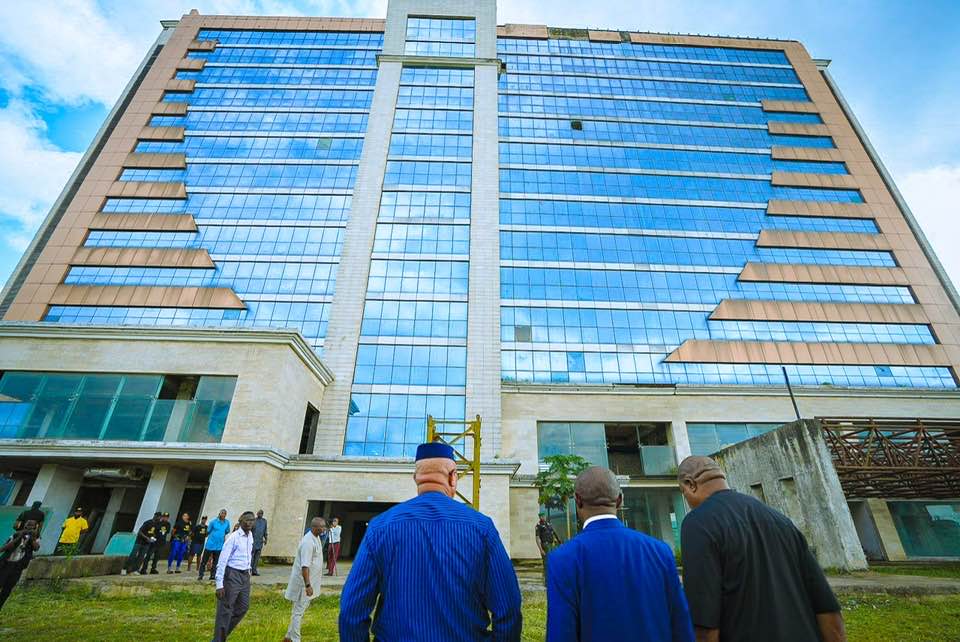Manufacturing is one of the mainstays of a nation’s economy, and it is reflective in the growth of the country that prioritizes this key aspect of its economy.
At the foundation of manufacturing is Supply Chain Management and this becomes critical to advancing the manufacturing sector of any country.
Today, Nigeria’s economy is being hit by inflation at 23.23%, with food inflation which is currently at 28.19% more dire. This is causing widespread concerns among businesses and consumers. Companies are experiencing skyrocketing operational costs, shortage of raw materials, amidst transportation challenges.
Manufacturing companies are finding it difficult to maintain profitability with increased pressure from cost of importation and transportation, as Nigeria depends a lot on importation. This leaves businesses that depend on importation and transportation mostly affected.
To evaluate the supply chain management systems and how crucial it is to advance manufacturing, an expert who featured on one of the flagship programmes on Inspiration FM ; TALKING POINT, on April 1, gave insights during the Live discussion. Inspiration 105.9 FM is Nigeria’s leading Family Radio Brands situated in the south south region of the country.
The radio talk hosted by On Air Personalities – Uwana George and Naomi Young, considered the topic of discourse from a smaller prism, evaluating how the global supply chain was affecting Nigeria’s sub-nationals. The resource person, a Supply Chain Expert, Mr. Enyinnaya Onuma, spoke on the nitty gritty of supply chain and how it works to enable an efficient business terrain.
“Supply chain is like the foundation of manufacturing. To manufacture, you need raw materials, and the supply chain connects rural producers to urban manufacturers. It also helps reduce cost—if planned properly—because it helps you decide whether to buy in bulk, how to transport your materials, and how often to purchase (weekly or monthly)”, he said.
Speaking further about procurement and Global Supply Change Management, he specifically acknowledged that Supply Chain is beyond logistics or the buying and supply of products. He stated that it encompasses analytics, as well as good business decision making, as he spoke about effective Supply Chain management.
According to him, efficiency in Supply chain simply requires getting all the supply chain management elements working together, achieving apt integration.
Onuma said, “Supply chain is far more than the simple act of buying and moving products. It involves a holistic process that includes the movement of goods, coordination among stakeholders, visibility across operations, responsiveness to market changes, and alignment with overall business objectives. A well-functioning supply chain integrates several key elements: demand forecasting – knowing what and when to buy; supplier relationship management – ensuring reliable partners for your materials; inventory control – understanding what you have, what you need, and how to manage it; and production planning – aligning raw materials with manufacturing schedules to optimize output.”.
He added; “It also involves understanding how materials move in and out of the system, and how real-time data analytics supports decision-making. The ability to interpret and act on data such as inventory levels, supplier performance, and customer demand is essential. When these elements are integrated and effectively managed, the result is a robust and efficient supply chain management system”.
A GOOD SUPPLY CHAIN MANAGEMENT SYSTEM VERSUS A BAD ONE
Mr Onuma insisted that companies that get their supply chain right are top leaders of the global market and with getting all supply chain components working together through effective supply chain management, they have mastered staying on top of their game. He mentioned companies such as Amazon, Walmart, amongst others.
From the one-hour discourse, Mr. Onuma established that a good supply chain has the underlined components; planning and forecasting, sourcing, production and manufacturing, logistics and Distribution, Technology and Data, as well as collaboration and communication. He did reflect how crucial having these components integrated into the management of supply chain for manufacturing yields tangible results.
Also, reacting to the rising global uncertainties and how nations are grappling with this aspect of economic growth, Mr. Onuma described the Nigerian supply chain terrain as a challenging one. He identified that Nigeria was still far behind in the scheme of things, highlighting that the nation is still plagued with insecurity, infrastructural deficit, making it difficult to meet up with supply chain demands, poor electricity supply, transportation system; bad roads, poor rail networks, and lack of adequate sea- ports. These, he noted, are all factors mitigating against the advancement of the supply chain in the country.
The expert who is a member of the Chartered Institute of Procurement and Supply said that another major bane of a good supply chain management system is lack of investment in the development of local suppliers in the country. He noted that there are no tools, training for them to serve manufacturers better in the country, insisting that building local capacity becomes crucial.
Onuma said it is easy to relate with the Infrastructural issues setting the Nigerian Supply chain system back, making it more fashionable for Nigeria to depend much on importation of goods from other countries, leaving us to get indecisive with taking long term solutions for efficient supply chain.
“An efficient supply chain will mean cutting off extra logistics that are not convenient”; the expert noted.
The resource person went ahead to affirm the major effort Nigeria was obviously making to improve its supply chain system. He pinpointed intensified efforts made to source materials locally in Nigeria, advising that these should be encouraged. He also lauded efforts by startups to integrated data as they make decisions for supply chain improvement.
Mr. Enyinnaya Onuma also explained the importance of Data. He reflected that it is a key part of the supply chain system and is integral to success in supply chain systems.
His explanation touched on how small-scale manufacturers can be more intentional about data, and they can start by using small data platforms to analyse supply chain activities and prioritise training on data mining.
LEVERAGING INFRASTRUCTURE TO ADVANCE SUPPLY CHAIN MANAGEMENT.
In the course of the conversation on radio, reference was made about a key infrastructure such as the Ibom Deep Seaport which is situated in Akwa Ibom state. Mr. Onuma believes the establishment of the seaport is not just an infrastructural project but remains a viable platform for economic transformation.
He underscored that the port would attract manufacturers into Akwa Ibom State, serve as a game changer, and reduce costs for manufacturers. He further noted that the infrastructure will aid shortened supply lines for business persons, thereby reducing costs drastically for more manufacturers, while decongesting the Lagos ports. The ripple effects are enormous, as it will attract industrial parks and will bring in faster logistics time for the region, he affirmed.
He projected that this infrastructure in Akwa Ibom will have a lot of manufacturers move to Akwa Ibom, while the state will attract foreign direct investments, boost employment, and heighten its development target for the economy.
His projections were tied to an instance where the jetties in Ibeno axis of Akwa Ibom State brought value to the state, as it serves the purpose of transporting, which can be effected on a larger scale through the Sea port. Mr. Onuma injected his experience with the functionality of the jetties in Akwa Ibom years back when he worked in the area as a Youth Corp member and subsequently being absorbed by ExxonMobil (an Oil and Gas Multinational Company), where he worked for nine years. For him, an Ibom deep seaport will heighten the gains, by boosting employment in the state, allowing for faster transit time, better regional integration, and more opportunities for local logistic providers.
In his words, “We could see the amount of economic value the jetty brought to a place like Akwa Ibom state. Imagine having a big sea-port, you will have shortened supply lines, you will be able to attract manufacturers into Akwa Ibom. Right now, you have to go to Lagos. Maybe your product comes into Lagos, you need to get a truck to ship it from Lagos down to Akwa Ibom state. That adds a lot of cost to your bottom line. Having a seaport in Akwa Ibom will be a game changer, it will reduce costs drastically for the manufacturers. It will be more efficient for everybody, not just Akwa Ibom, but everyone in Nigeria”.
He also buttressed that “Manufacturing is key to any growing economy. Once Akwa Ibom State begins large-scale manufacturing, it will have a major impact on the state’s economy. On the issue of a product being made in the state but still being imported from outside, it’s all about marketing—how to get your goods to customers. To solve this, there’s a need to incentivize locally made products and pay more attention to the cost competitiveness of those products”.
Mr Onuma added that when it comes to the Ibom Seaport, it’s more about bringing materials into Akwa Ibom and also exporting. He broke down the operations of this key infrastructure as he expanded on the conversation.
According to him, “When a ship arrives at the port, it typically carries containers filled with imported goods. Once those goods are offloaded, the vessel is then loaded with outbound products for export. The materials brought in through the port often serve as inputs for manufacturing, and the finished products are subsequently shipped out through the same port. This cyclical flow of import and export is central to a productive and globally connected manufacturing ecosystem.”
The expert explained that this infrastructure reduces logistics costs because, normally, traders would have to send money to Lagos to find someone to coordinate the importation or exportation of goods. The Ibom Deep Seaport will also provide jobs, considering that it requires skilled labour to run efficiently.
He advised people in Akwa Ibom State to take advantage of the opportunity through training and sensitization on the opportunities the seaport will create in the days ahead.
Conclusively, the Supply chain expert stated emphatically that for a manufacturing industry to thrive, there is need for stable electricity; a major issue Nigeria is still grappling with till date. “Right now, power supply is still a major challenge, and manufacturers have to rely on diesel or petrol generators, which increases the cost of goods”; he submitted.
Mr. Enyinnaya Onuma is a seasoned supply chain and procurement expert with over a decade of experience across the oil and gas, manufacturing, and distribution sectors. He has held strategic roles at globally recognized corporations such as ExxonMobil and Shell, where he managed multi-million-dollar supply chain portfolios and coordinated complex supplier networks supporting critical operations.
Mr. Onuma’s expertise spans contract negotiation, supplier performance management, logistics coordination, and procurement optimization. He played a pivotal role in maintaining uninterrupted operations by implementing robust supply chain frameworks, advancing vendor development programs, and driving process improvement initiatives grounded in Lean Six Sigma methodologies. He mentors early-career professionals and supports research efforts focused on innovation and resilience in supply chain systems.
Mr. Onuma is particularly passionate about using supply chain excellence to drive economic development at both state and national levels, with a focus on industrial growth, local content development, and infrastructure-driven transformation.











